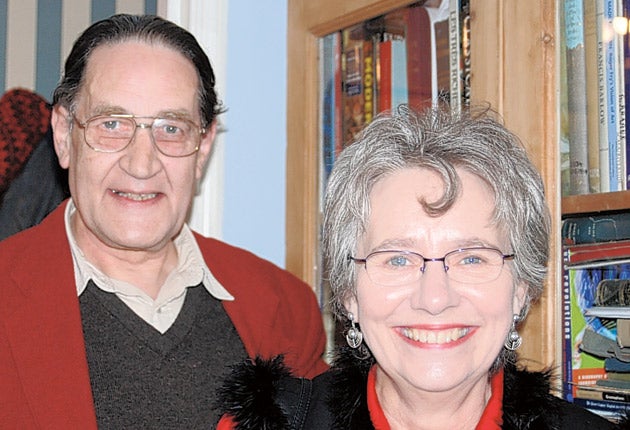Paul Kriwaczek: BBC TV producer and author of engaging books on the ancient world

Paul Kriwaczek was a radio and television producer and latterly an historian and author, a man whose cultural versatility and intellectual adventurousness were reflected in a richly variegated career.
In the late 1960s he became Persian language supervisor in the BBC's External Services (predecessor of the World Service) and in 1970 transferred to television, where he produced a wide range of documentaries, initially in Science & Features and later in the Education department, where in 1988 he became executive producer.
After he left the BBC in 1993, Kriwaczek undertook freelance work as a dialogue coach and voice-over artist, skills to which his linguistic abilities and richly resonant voice (doubtless enhanced by his habit of sucking on a curved, Sherlock Holmes-style pipe) rendered him peculiarly suited. He also wrote several books: a textbook on the art and craft of the TV documentary was followed by In Search of Zarathustra (2002), Yiddish Civilisation (2005) and Babylon (2010). A few months before his death, while trying to come to terms with the cancer that eventually defeated him, he had begun thinking about a new project: a book that would focus on pivotal eras or turning points in the history of some of the great cities of the Ancient World.
Born in Vienna on 30 November 1937, Paul Kriwaczek was brought to England in 1939 when his parents escaped from Nazified Austria. He attended grammar school in London and studied at the London Hospital Medical School. Something of a natural performer, Kriwaczek was attracted to the stage as a young man, made a few radio and film appearances and translated Brecht's Herr Puntila and his Manservant Matti for the RSC before going on to qualify in dentistry. Like many adventurous youngsters in the early 1960s, he travelled extensively through the "developing" world, settling for a while in Kabul, where he became dental surgeon to the Afghan royal family, and produced the first ever film about the national game of Afghanistan, Bouzkashi.
In 1968, this natural boundary-crosser found his métier as a BBC producer, writing and producing radio programmes that went out in English, Hindi, Urdu, Nepali, Burmese, Farsi and Pashto. Moving across to television a couple of years later, he worked with presenters such as David Bellamy, Jane Glover and Chris Serle and was one of the driving forces behind the BBC's Computer Literacy Project. His final series, Living Islam (co-produced with Hugh Purcell), provided an unusually deep and considered view of Islamic history and culture. Kriwaczek was a questioning spirit – too much so, perhaps, to become a departmental head or corporate executive; his instincts led him, rather, to a series of kindly enablers (or "princes") who would encourage him to do his own creative thing. These included the BBC's David Hargreaves and later the publisher Toby Mundy.
Throughout his life, Kriwaczek, a Fellow of the Royal Society of Arts, retained the wide, cross-cultural perspectives characteristic of many with his Austro-Jewish ancestry. A warm and formidable presence, he loved nothing more than an intense but wit-packed conversation. Virtually any subject would do as a starting point: the worlds of ancient Babylon or Rome, the human impact of the medieval church or of Tsarist Russia, the anomalies of street life in mid-20th-century Kabul or the socio-cultural innovations in prospect by the mid-21st.
His later books scanned vast intellectual horizons but were written in the seductive and engaging style of a born communicator. Many authors have chronicled the history of the Jews in Biblical times, under the Romans and later in Tsarist Russia and beyond. But the continuities in between were far less well known to the general reader until tackled by Kriwaczek in Yiddish Civilisation. Here, as in Babylon, he characteristically juxtaposed his historical expertise with stories derived from his own travels through the Middle East and Islamic world, the achievements of modern archaeology and the wars of recent times, adding diverse metaphors and references as balm with which to soothe the anxieties of the insecure reader. In Babylon, all life is there, from the experience of crossing the street in Oxford or of modern stargazing to the TV series Sex and the City, Gilgamesh as a King Arthur figure in search of the grail, the writings of Huizinga and T S Eliot – and Richard Neville and the hippy trail. Behind this was a serious purpose: to demonstrate how the civilisation we have inherited derives less from the legacy of Greece and Rome than is commonly supposed and far more from that of ancient Mesopotamia.
Kriwaczek was exceptionally widely read, but the first to acknowledge his limitations, modestly proclaiming himself the "Master of the Tertiary Source". But his writings, like his many award-winning TV programmes and his vigorous conversation, remain in the mind as eloquent testimony to a man of great learning, imagination, charm and humour. On his deathbed, he treated me to the clearest explanation of the historico-cultural differences between Shia and Sunni Islam that I have ever seen, heard or read. Kriwaczek was a true homo universalis to whom the entirety of human experience was inter-connected – or would be (he implied), if only one thought about it hard enough!
Paul Kriwaczek is survived by his wife, Jeannette (whom he met and married in 1966 when she was the nurse in his dental practice in Essex), their children Rohan, Tamor and Nandi, and seven grandchildren.
Paul Kriwaczek, radio and television producer and author: born Vienna 30 November 1937; married 1966 Jeannette (three children); died 2 March 2011.
Join our commenting forum
Join thought-provoking conversations, follow other Independent readers and see their replies
Comments